Dogs are known as a man’s best friend, but would a friend leave hair all over your furniture and yell every time a package is delivered to your home? Shedding and barking are two of the top dog-owner complaints. These can be especially problematic if you live in a small apartment with easily irritable neighbors. In this article, we introduce you to some adorable small dog breeds that don’t shed or bark. Which is your favorite?
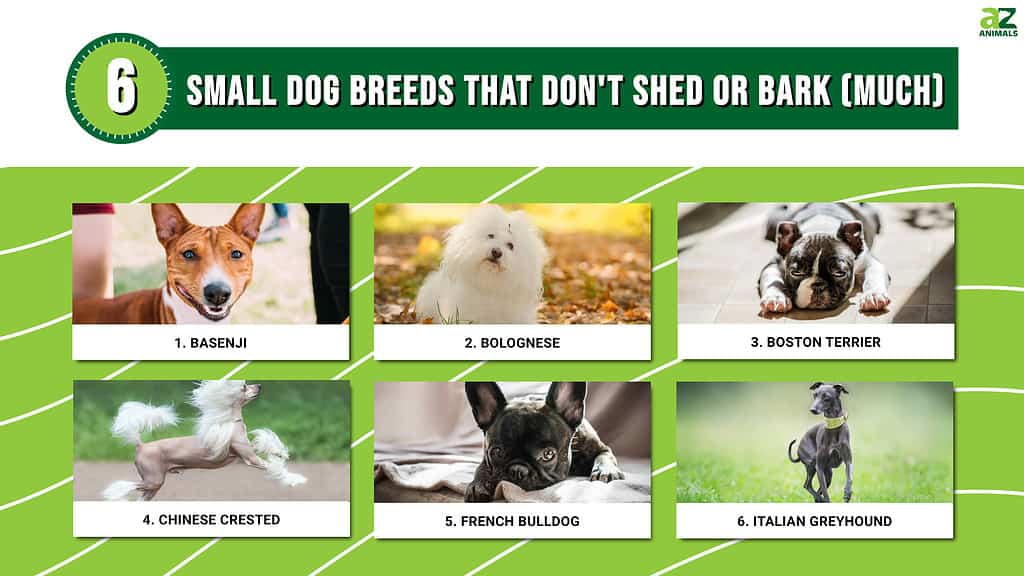
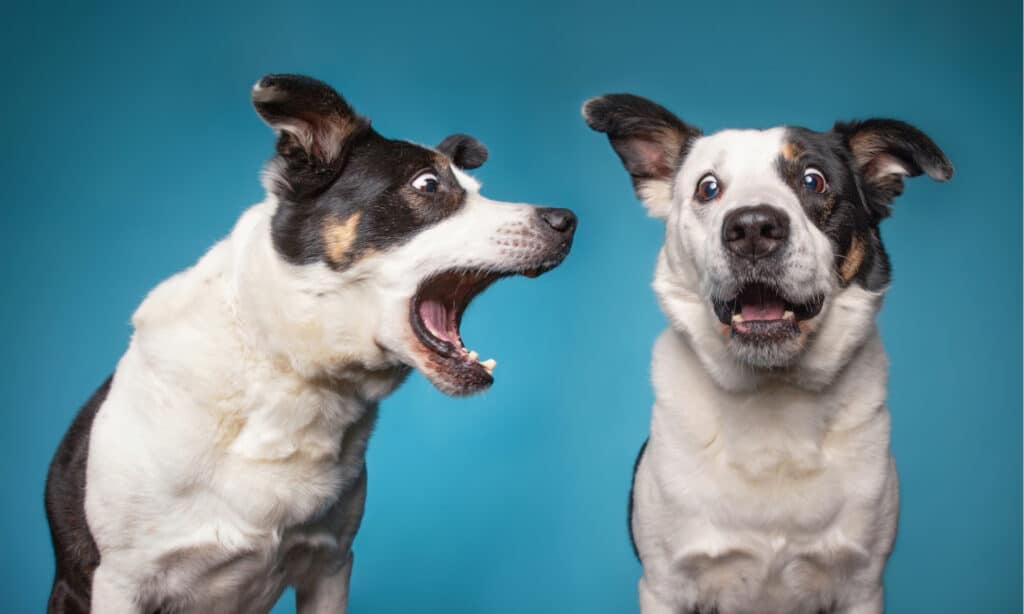
Would a real friend bark in your face for no reason whatsoever?
©Annette Shaff/Shutterstock.com
Why Do Some Breeds Shed More Than Others?
First off, there is no such thing as a completely hypoallergenic dog, but some breeds aggravate allergies less than other breeds. Some have a hair texture more like human hair, they produce less dander, and have a longer hair growth cycle so that they shed less often. Dogs that stay outdoors tend to shed their winter coats in the spring and fall, alternating between thicker winter coats and lighter summer ones. Indoor dogs shed year-round because the light and heat indoors are relatively constant. However, dogs can also shed because of stress, anxiety, or poor nutrition. If your dog is uncharacteristically shedding a surprising amount, talk to your vet and groomer about possible reasons and any necessary changes to the dog’s diet, grooming regimen, and environment. Coconut oil contains healthy fats and is often recommended as a dietary supplement to improve skin and coat health.
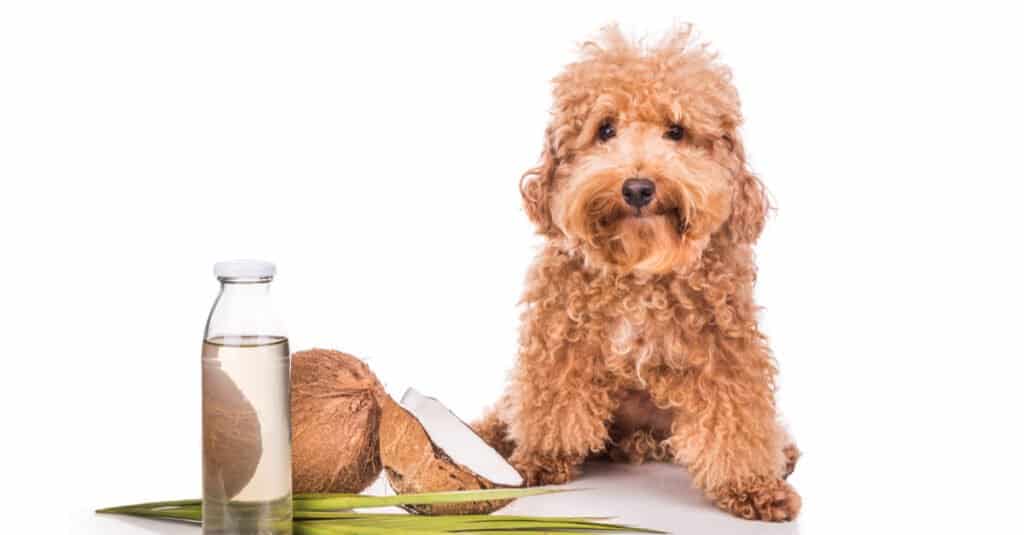
Coconut oil may improve your dog’s skin and coat.
©ThamKC/Shutterstock.com
Brush Options for Shedding Dogs
Even dogs that don’t shed much will still need brushing and even professional grooming from time to time. This helps remove dead hairs so that new healthy ones can grow. Here are some different types of brushes and which coat types they are most suitable for:
- Bristle Brush – Can be used with all types of coats but dogs with longer coats need a brush with longer and more widely spaced bristles. If your dog has coarse hair, choose a brush with stiffer bristles.
- Wire-Pin Brush – This is a good brush for medium to long woolly or curly coats.
- Slicker Brush – These are good brushes for removing mats and tangles due to fine wire bristles. Be careful about scratching your dog’s skin with the bristles, as they can hurt.
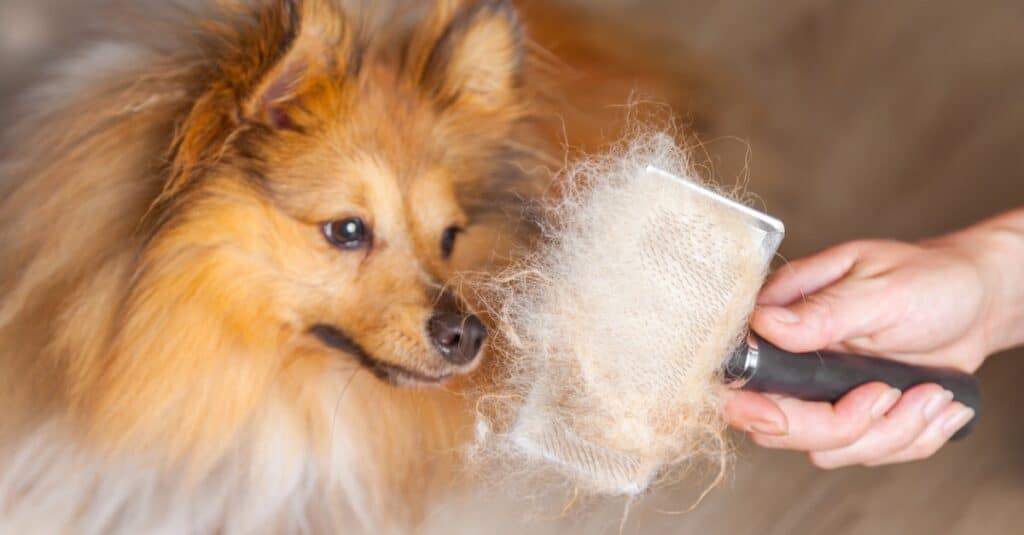
A slicker brush can remove mats and dead hair but hurts when scraped too aggressively against the skin.
©Filmbildfabrik/Shutterstock.com
What Makes Some Dogs So Barky?
Barking is one of the primary ways dogs communicate, just as humans communicate by talking. Dogs bark to get the attention of other dogs, express different emotions, defend their territory, or to get their owner to notice them. They can also bark out of boredom and frustration when they don’t have enough stimulation in their environment. Although this barking can be irritating, some breeds were specifically bred for it, such as guard dogs or herding dogs.
Here are some tips to help retrain a dog that barks more than you’d like:
- Don’t yell at your dog, as this just reinforces the behavior, especially if what he wants is attention.
- Figure out what is triggering your dog and what she is trying to express. If your dog barks to get attention, try to give her more attention at times when she is not barking.
- Desensitize your dog to triggers. For example, if he is scared of the vacuum, gradually expose him to the vacuum and reward him when he doesn’t bark.
- Provide adequate stimulation for your dog in the form of interesting toys, walks, and playtime. If your dog barks and bothers the neighbors while you’re at work, consider hiring a dog walker or leaving your pet at doggie daycare to play with other pooches.
Now, without further ado, here is our list of small dogs that don’t shed or bark very much:
1. Basenji
Basenjis are a small African breed described as “barkless” dogs. Due to the shape of their larynxes, they actually can’t bark in the traditional sense. That doesn’t mean they’re quiet, though. They make a sound that has been described as “yodeling” as well as other doggy vocalizations like growling, whimpering, or whining. Generally, though, their vocalization level is below that of other dogs. They have short, thick coats that do not shed very much. Brushing once a week to pull out dead hairs is all the grooming they need.
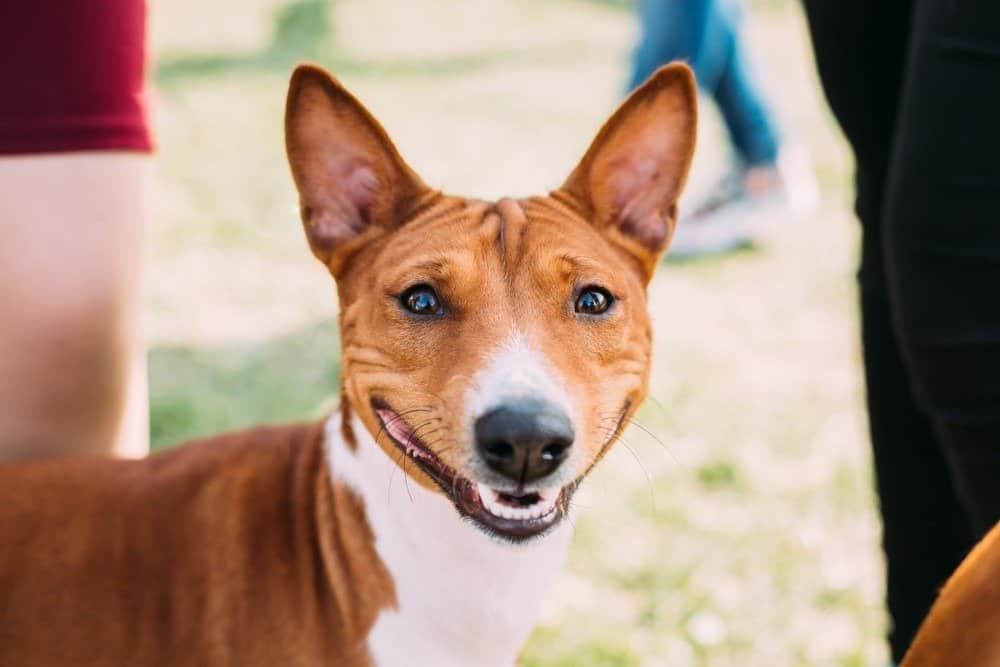
Basenjis don’t bark, but they do yodel. Will your neighbors be ok with that?
©Grisha Bruev/Shutterstock.com
2. Bolognese
At first glance, you might think a poofy dog like the Bolognese would be a nightmare shedder. But in fact, they don’t shed much at all. This means your options are not limited to short-haired dogs when you’re looking for a non-shedder. They also have a calm, quiet, polite disposition. They’ll bark when they feel endangered, but otherwise, they’re very good listeners and observers – just what you would like to come home to after a long, tiring day.
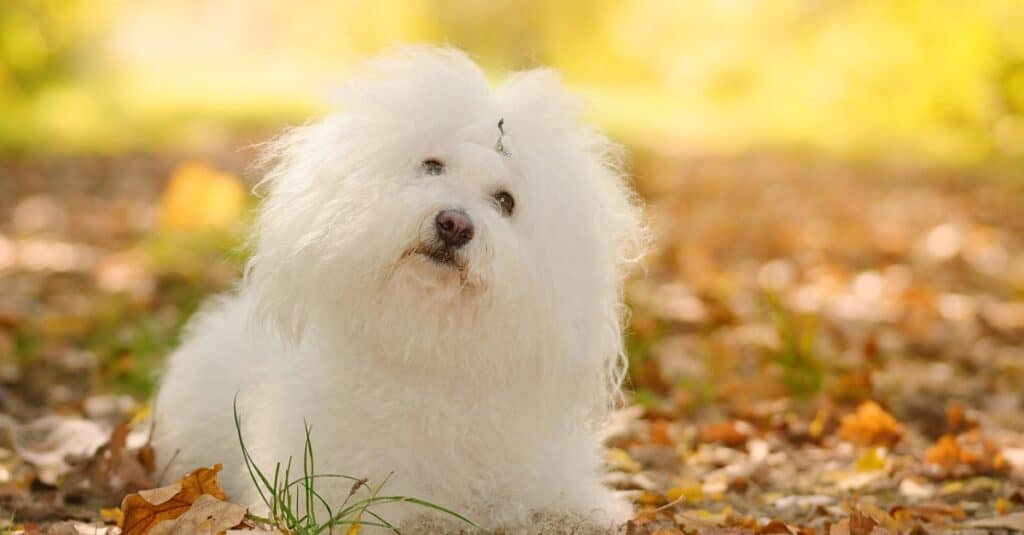
Believe it or not, Bolognese, like this little floof, does not shed.
©iStock.com/sssss1gmel
3. Boston Terrier
Boston terriers are enthusiastic and adore people, but they are not as exuberantly energetic as other terriers. They are quiet and enjoy their naps quite a bit. Their coat is thin, short, and made of a single layer of hair, so shedding is minimal. Best of all, their coats are black on top and white underneath, making them look like they’re wearing little tuxedos! What do you do on Casual Friday? Just put a sweater on them, they don’t mind.
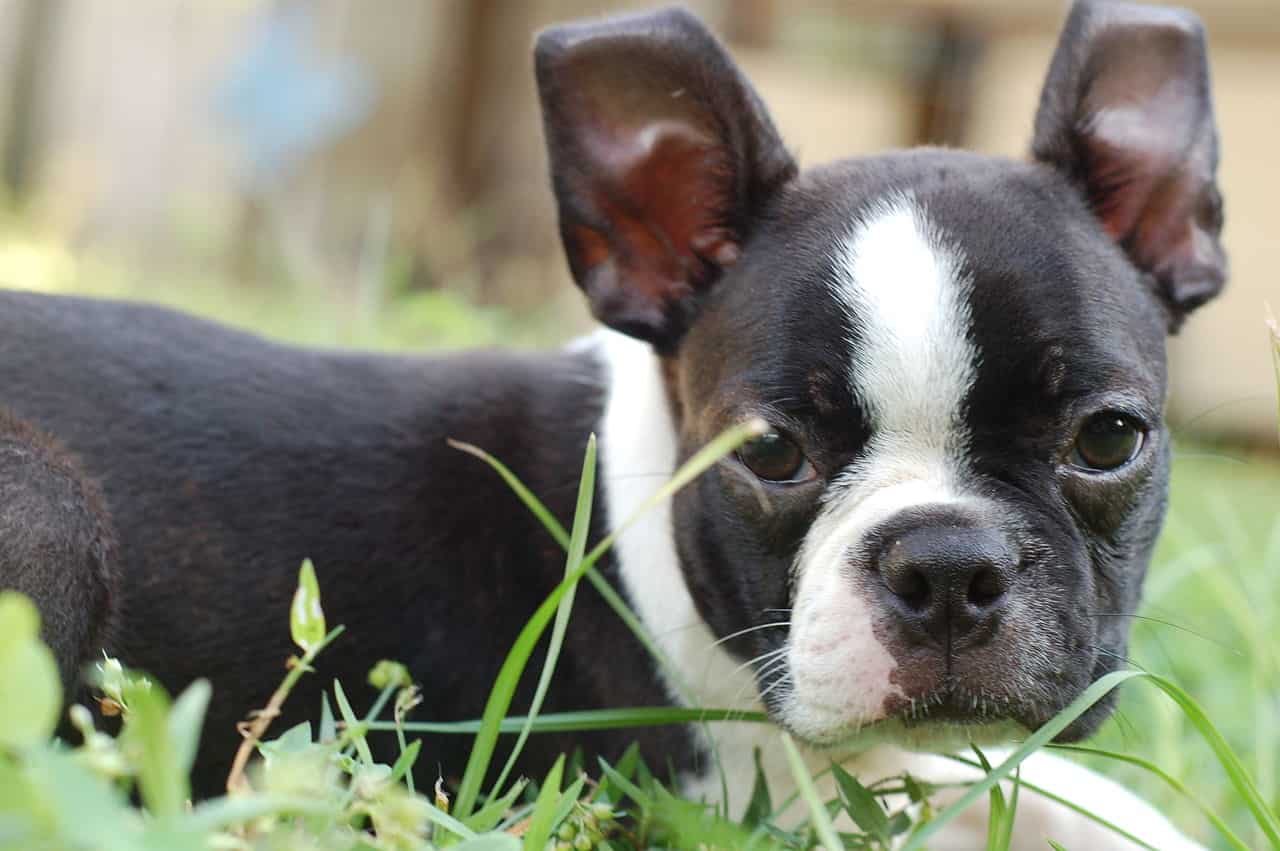
This cute pupper in formalwear reveals why Boston Terriers are little heartbreakers!
©Tricia (elvissa) / CC BY 2.0, Flickr – License
4. Chinese Crested
Chinese crested dogs come in two varieties: one is hairless and the other is covered in floofy, silky hair. Here’s the good, the bad, and the ugly when it comes to Chinese crested dogs:
- The Good: They are generally quiet, gentle, affectionate lap dogs. They also prance around like little ponies.
- The Bad: Neither variety sheds much but even the hairless ones have Dr. Suess-like ruffles around their feet, tail, and head that require brushing to avoid tangles.
- The Ugly: Since the World’s Ugliest Dog Contest began in 1970, Chinese crested dogs have won 22 times. On the bright side, few images on the Internet will make you laugh as hard as these “beauties.”
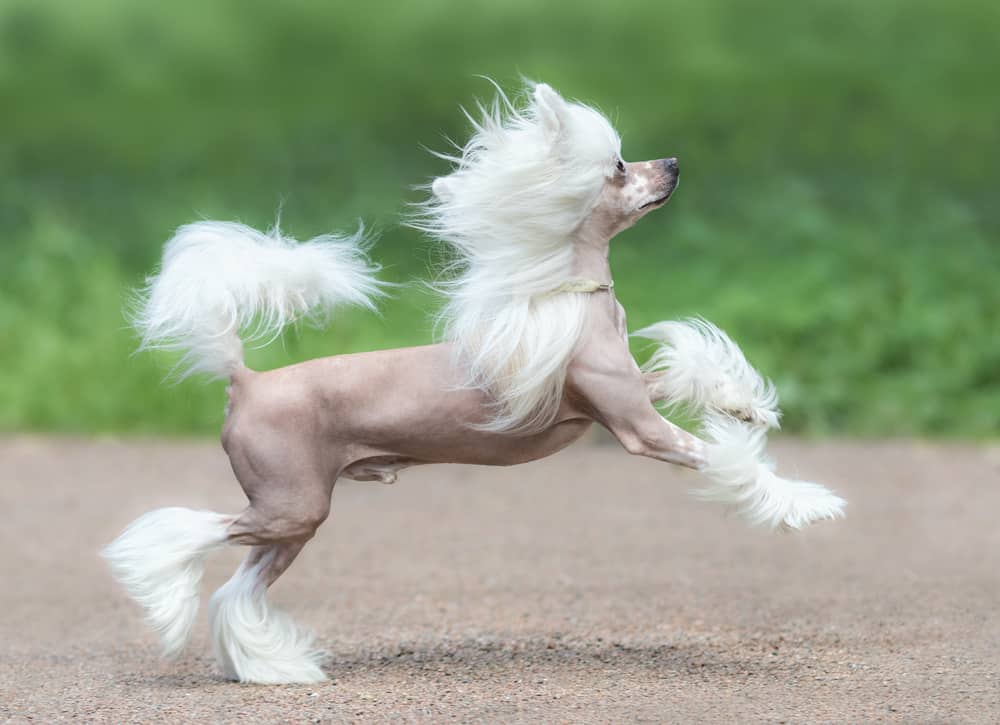
Seeing this proud little pony, who would guess that Chinese crested regularly wins World’s Ugliest Dog?
©Abramova Kseniya/Shutterstock.com
5. French Bulldog
French bulldogs are adorably cute and have a nice disposition, too. They are calm and quiet and have short, fine coats that don’t shed much and require minimal care. They do tend to have respiratory issues though. You’ll notice they snort and huff and puff a lot and snore when they sleep, but barking is not too much of an issue with these guys.
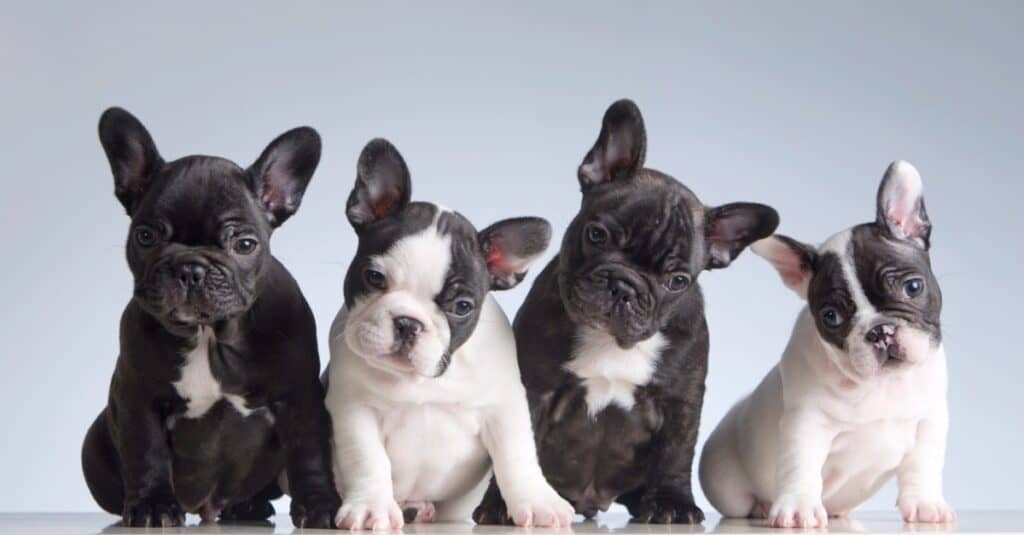
Ooh! Frenchie puppies! Don’t you want them all?
©iStock.com/Celiaaa
6. Italian Greyhound
Among the small breeds that don’t shed or bark, the Italian greyhound is one of the most elegant. Originally bred to hunt small prey, Italian greyhounds today are known as graceful, gentle, beautiful pets. They have short, silky-smooth coats. They don’t bark a lot but will do so to warn of danger – exactly when you want your dog to bark.
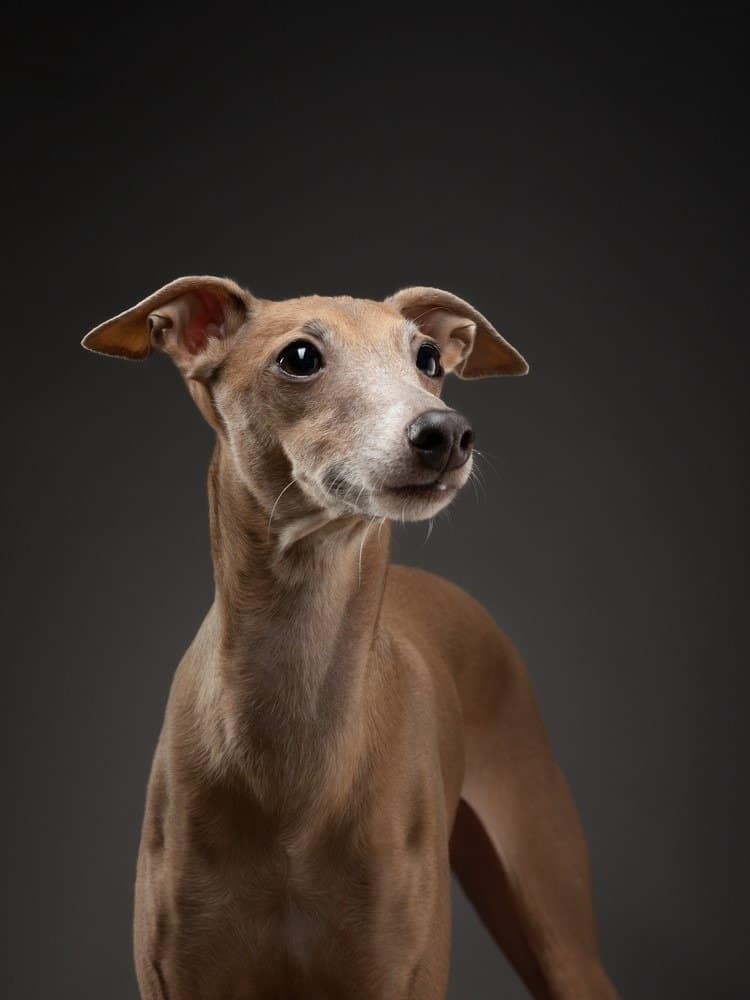
One of the most regal small breeds that don’t shed or bark is the Italian greyhound.
©dezy/Shutterstock.com
Your Favorite?
It’s good to research dog breeds that don’t shed or bark before choosing one for your family. Otherwise, it’s easy to make a decision just based on a breed’s appearance, or how it pulls on your heartstrings, rather than making a choice that will be suitable for the lifestyle and environment you have to offer. The last thing you’d want to do is invest your time, energy, and emotions in a dog only to have to rehome her because your child is allergic, or your neighbors are irate at the noise. Fortunately, dogs come in such a wide variety of sizes, temperaments, and physical characteristics, you’re sure to find one that’s just right for you.
Summary of 6 Popular Small Dog Breeds That Don’t Shed or Bark
| Dog Breed | Coat | |
|---|---|---|
| 1 | Basenji | Short dense coats only require brushing once a week |
| 2 | Bolognese | Poofy coats don’t shed |
| 3 | Boston Terrier | Thin, short, single-layered coat |
| 4 | Chinese Crested | Hair is long and tangles – but doesn’t shed much |
| 5 | French Bulldog | Short, fine coats require little care |
| 6 | Italian Greyhound | Short, silky smooth coats |
The photo featured at the top of this post is © WilleeCole Photography/Shutterstock.com
Ready to discover the top 10 cutest dog breeds in the entire world?
How about the fastest dogs, the largest dogs and those that are -- quite frankly -- just the kindest dogs on the planet? Each day, AZ Animals sends out lists just like this to our thousands of email subscribers. And the best part? It's FREE. Join today by entering your email below.
Thank you for reading! Have some feedback for us? Contact the AZ Animals editorial team.






